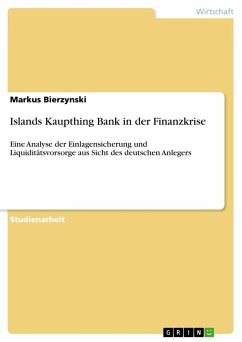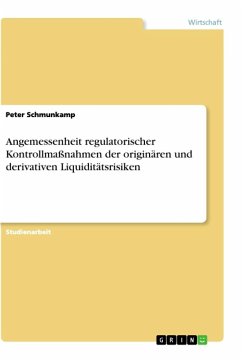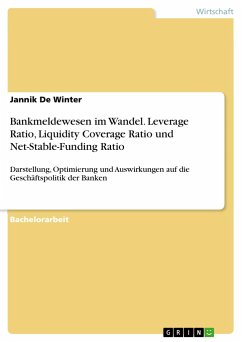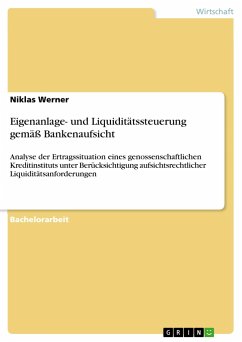
Islands Kaupthing Bank in der Finanzkrise
Eine Analyse der Einlagensicherung und Liquiditätsvorsorge aus Sicht des deutschen Anlegers

PAYBACK Punkte
0 °P sammeln!
Studienarbeit aus dem Jahr 2011 im Fachbereich BWL - Bank, Börse, Versicherung, Note: 1,0, Europa-Universität Viadrina Frankfurt (Oder), Veranstaltung: Privatisierung, Insolvenz und Restrukturierung in Transformationsstaaten / Teil II - Makroökonomische und juristische Perspektiven von Systemtransformation in MOE und Finanzkrise, Sprache: Deutsch, Abstract: In the year 2007 the financial crisis began due to high-flying banks attempting to gain moreand more profit. In the course of that several banks went bankrupt, because the systembroke down partly and was only able to survive with the hel...
Studienarbeit aus dem Jahr 2011 im Fachbereich BWL - Bank, Börse, Versicherung, Note: 1,0, Europa-Universität Viadrina Frankfurt (Oder), Veranstaltung: Privatisierung, Insolvenz und Restrukturierung in Transformationsstaaten / Teil II - Makroökonomische und juristische Perspektiven von Systemtransformation in MOE und Finanzkrise, Sprache: Deutsch, Abstract: In the year 2007 the financial crisis began due to high-flying banks attempting to gain moreand more profit. In the course of that several banks went bankrupt, because the systembroke down partly and was only able to survive with the help of governments' interventions.There are many articles available about this topic all over the world. This paper takesanother point of view on that situation and focuses on the Icelandic banking sector andespecially on the Kaupthing Bank. The situation is reviewed out of a German depositor'spoint of view due to the - only short - discussion in German media and the possible biglosses of them. Emphasis is placed on the deposit protection and liquidity management inbanks, which should be strengthened through the development of the new Basel-III-scheme.While considering depositor's protection and therefore bank's liquidity management, thenew Liquidity Coverage Ratio (LCR) and the Net Stable Funding Ratio (NSFR) are discussed indetail. The new developed management ratios will be implemented and analyzedhypothetically. An answer should be found to the question, whether Basel-III would havebeen able to improve the situation concerning liquidity management. The second questionasked is, whether there are possible improvements concerning deposit protection in foreignbank branches in Germany. In the end the paper tries to find a way of designing the depositprotection system more transparent and therefore more reliable for German households.













